Winterlong
 fig. a: winter, long
fig. a: winter, long
We were already pretty ecstatic about our experiments with baking bread à la Chad Robertson's Tartine Bread. Actually, I should rephrase that: we were completely ecstatic and our experiments quickly developed into a full-fledged practice. We honestly didn't think we could be any happier with Robertson's no-knead sourdough bread, and then, all of a sudden, it happened: our loaves got even better.
This shift corresponded with a change in technology. Instead of baking our loaves exclusively in our trusty orange enameled Dutch oven, we took Robertson's advice and picked up a Lodge combo cooker, a 100% cast-iron combination Dutch oven & skillet. Not only does the combo cooker have a little more volume than our enameled Dutch oven (allowing your loaf to rise and expand fully without cooking against the wall), but it's designed so that either element--the shallow skillet or the deep pan--can act as the lid for the other. This means that you can gently place your shaped loaf into the shallow skillet without dropping it, or risk burning yourself in the process, and scoring your loaves immediately prior to baking them becomes a whole lot easier because the rim of the skillet is so much lower.
If you can't picture what I'm talking about, the Lodge combo cooker looks something like this:
 fig. b: combo cooker 1
fig. b: combo cooker 1
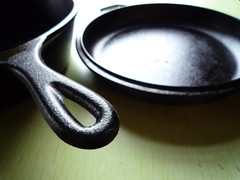 fig. c: combo cooker 2
fig. c: combo cooker 2
And this is the way it appears in Tartine Bread:
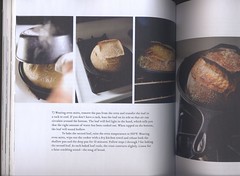 fig. d: combo cooker 3
fig. d: combo cooker 3
Now, it's true that our loaves got better around the time that we started using the combo cooker, but they didn't get better because of the combo cooker. Over and over again in the pages of Tartine Bread, Robertson insists that it's not technology that makes the bread. You don't need a fancy oven. You don't need a professional mixer. Et cetera. A Dutch oven helps one simulate the conditions one finds in a professional bread-baking oven--it creates what Robertson calls "the two main characteristics of a professional brick oven: a sealed moist chamber and strong radiant heat"--but, ultimately, the secret to making great sourdough lies in two things: the baker's hands and the baker's skill in managing the fermentation process.
So, yes, the combo cooker made it a little easier to bake our loaves, it gave them a bit more room to grow when we did, and it helped produce an awful nice crust, but the sudden improvement in the quality of our loaves had more to do with other matters. It had to do with the fact that we'd gotten a little better at handling our dough and forming our loaves, but, more than anything, it had to do with our increased level of patience. As mentioned earlier, Robertson is terribly insistent that one take one's time with his process, that one give one's sourdough all the time it needs to ferment, mature, and build structure--and rightfully so. And we were patient--we generally took our time and didn't rush things. We learned to work the Tartine method into our schedules in such a way that we didn't cut corners.
But what only dawned on us slowly--a full 2 to 2 1/2 months into our love affair with Tartine Bread--was that it still wasn't enough, for one simple reason: we were baking our loaves in Montreal, not San Francisco, and it was mid-winter. Robertson describes the ideal environment for his bulk fermentation as being 78º - 82º F. He describes the ideal environment for his final rise as being 75º - 80º F. Well, you know what? It was nowhere near those conditions in our chilly Montreal apartment. I know there are probably plenty of Montreal homes out there that are overheated to semi-tropical, perhaps even tropical, extremes--where the room temperature, even in the depths of winter, might actually approach (or even surpass) 75º - 82º F--but AEB HQ ain't one of them. We try to shovel as little of our money into Hydro Québec's coffers as possible--and, besides, we like wearing sweaters and slippers during the winter.
Anyway, what we suddenly realized was that we weren't being patient enough. The conditions in our apartment weren't anything like those described by Robertson--therefore, we needed to give our poor sourdough loaves even more time to reach maturity. What was already a slow process--the very definition of "slow food"--needed to be slowed down further. Ironically, we found that this new super-slo-mo version of the Tartine Bread process was easier to fit into our schedules. Taking it easy--stretching the process our over a couple of days--actually made bread-making easier to manage. More importantly, our loaves seemed lighter, happier, more alive--just look at them:
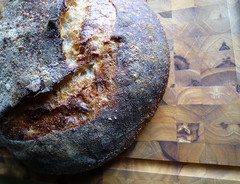 fig. e: new country 1
fig. e: new country 1
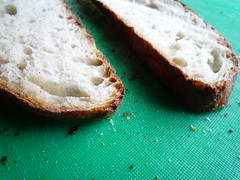 fig. f: new country 2
fig. f: new country 2
As mentioned before, one of the chief strengths of Tartine Bread is the way it teaches you to really study the sourdough process, to be attentive, and to learn to think on one's feet and make necessary adjustments. The moral of the story? Who knows what challenges the other seasons will hold, but when it comes to baking sourdough at home in a nordic climate like Montreal's, winter = long.
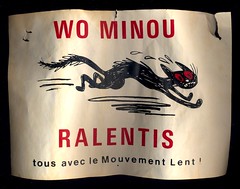 fig. g: wo, minou!
fig. g: wo, minou!
Take your time. Brew a pot of tea. Read a book. Listen to some music. Enjoy the process.
aj
p.s. Interested in getting your very own Lodge combo cooker? They're hard to find in Canada, but readily available in the United States. They're not very expensive, and they've got plenty of uses beyond baking bread. You can even find them on Amazon. For more information, check out the Lodge website.
p.s. 2: So far we've tackled: Basic Country Bread, Olive, Walnut, Polenta, Whole Wheat, Semolina, Country Rye, and Pizza. Next up: Baguettes and Enriched Breads.
p.s. 3: If you missed our original dissertation on Chad Robertson's Tartine Bread, you can find it here.
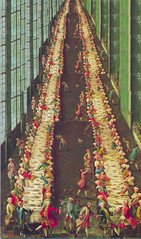

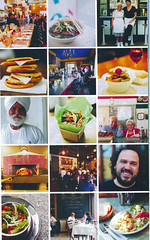





2 comments:
AJ,
Your bread experiments look so tasty. One of my favourites is creating citrus pull-apart breads. You should check out Baking for All Occasions by Flo Braker. Her pull-apart is delicious.
Hope you're entering the new show Recipe to Riches on Saturday. There's an open casting call at the Hyatt Regency on Feb 19!
More details at: http://recipetoriches.ca.
Micol
Hi, Micol,
thanks for the tip--I'll check it out
what about you?--did you enter Recipe to Riches?
Post a Comment